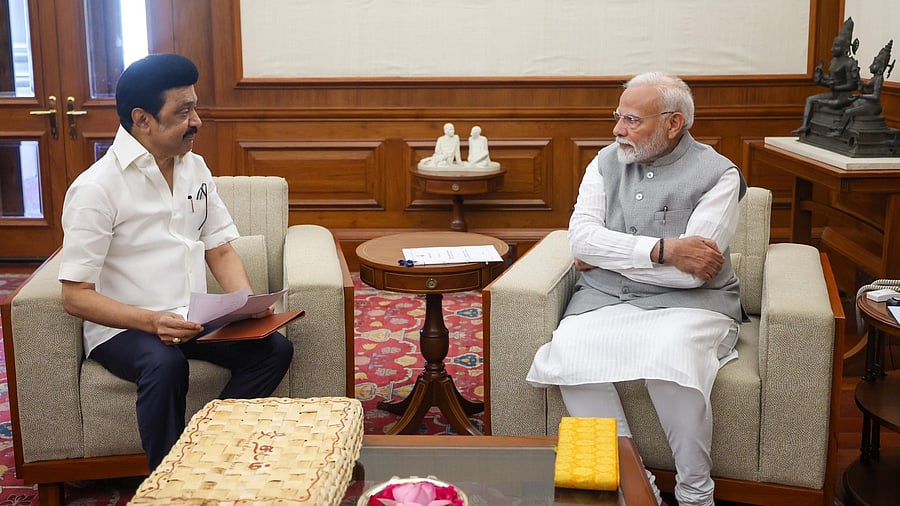
MK Stalin with PM Modi.
Credit: X/@mkstalin
Chennai: Asserting that the Tamil Nadu government will not allow any mining activity in ecologically sensitive areas, Chief Minister M K Stalin has nudged Prime Minister Narendra Modi to cancel the rights awarded to Hindustan Zinc Limited to mine tungsten in Madurai district.
Stalin also asked Modi to instruct the Union Ministry of Mines to desist from floating bids for mining with the consent of the respective state government.
The development comes after hundreds of people from about 48 villages rose in protest against the award of the rights to mine tungsten in 10 villages in Melur taluk in Madurai, which are located close to Arittapatti, Tamil Nadu’s first Biodiversity Heritage Site.
In the letter to Modi, Stalin recalled that Tamil Nadu Water Resources Minister Durai Murugan wrote to the Union Coal Minister on auctioning of mining rights of critical and strategic minerals and noted that the Centre rejected the concerns, arguing that the auction of critical minerals cannot be withheld, in the larger interests of the country.
Union Ministry of Mines has declared Hindustan Zinc Limited, a Vedanta Group company, as the preferred bidder of Nayakkarpatti Tungsten block (Critical and Strategic Mineral) on November 7.
“Among them, Arittapatti is a notified Biodiversity Heritage site and is famous for archaeological monuments including cave temples, sculptures, Jain symbols, Tamil Brahmi Scripts and Pancha Pandavar stone beds. Any mining activity will cause irreparable damage to these sites,” Stalin said.
He also added that any commercial mining in such densely populated villages will definitely affect the people living there and pointed to people’s anguish and fear that their livelihood may be lost forever.
“…the Government of Tamil Nadu would never allow any such mining to be undertaken in these areas. Considering the above situation, I urge you to instruct the Ministry of Mines to cancel the award of tungsten mining rights given to Hindustan Zinc Limited in Madurai District,” Stalin said.
The villagers, during a protest on November 28, argued that the project would lead to “permanent ecological destruction” in their region, which was notified as the first Biodiversity Heritage Site of Tamil Nadu in 2022.
The protests are not just limited to tungsten mining but also to Vedanta, which has had a chequered history in Tamil Nadu as its group company Sterlite Copper was shut down in 2018 following the death of 13 people in police firing at people protesting against the company’s expansion plans.
Arittapatti consists of a chain of seven barren granite hillocks and a distinctive landscape of rocky hills that acts as a watershed, supporting 72 lakes, 200 natural spring pools, and 3 check dams.
Hillocks in Arittapatti village have rich biological and historical significance with the presence of around 250 bird species, including 3 flagship Raptor species – Laggar Falcon (Falco jugger), Shaheen Falcon (Falco peregrines), and Bonelli's Eagle (Aquila fasciata). The village also features various megalithic structures, Tamil Brahmi inscriptions, Jain Beds, and 2200-year-old rock-cut temples.
A summary of the mineral block accessed by DH says the mines are located in Kulanipatti and Melur villages in Melur taluk and that the area is characterised by plain topography except some hillocks and elongated hills.
The opposition to the project comes weeks after the Supreme Court rejected Vedanta’s plea to reopen the now-shut copper smelter owned by its subsidiary Sterlite Copper in Thoothukudi. The factory was shut in May 2018 after massive protests against the company’s expansion ended in the killing of 13 civilians by the police who fired indiscriminately against the agitators.